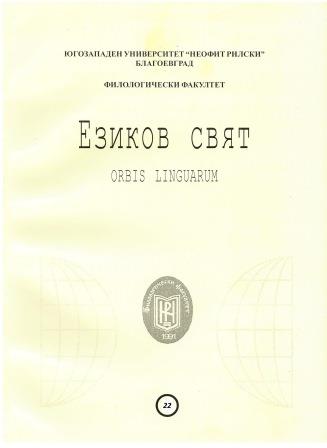LEXICOGRAPHIC ORGANOLEPTICS: PERCEPTUAL SIGN ‘TASTE’ IN THE DEFINITION OF FRUIT NAMES (BASED ON DICTIONARIES OF DIFFERENT LANGUAGES)
LEXICOGRAPHIC ORGANOLEPTICS: PERCEPTUAL SIGN ‘TASTE’ IN THE DEFINITION OF FRUIT NAMES (BASED ON DICTIONARIES OF DIFFERENT LANGUAGES)
Author(s): Marharyta Zhuikova, Alina YodlovskaSubject(s): Language and Literature Studies, Theoretical Linguistics, Lexis, Comparative Linguistics, Philology
Published by: ЮГОЗАПАДЕН УНИВЕРСИТЕТ »НЕОФИТ РИЛСКИ«
Keywords: explanatory dictionary; definition; perception; fruits; taste marker
Summary/Abstract: 223 definitions of lexemes of the thematic group “Fruits” selected from ten dictionaries of eight different languages were investigated in this article. All researched dictionaries were designed for a wide range of speakers and created in the second half of the twentieth century. The analysis showed that all definitions are specific, despite the fact that they provide information about the same objects perceivable by a human via senses. The task was to identify the peculiarities of using the taste marker when describing a particular fruit in different dictionaries. Two fruits that have the highest marker usage rate for “taste” are date and grapefruit. It can be explained by some deviation from the organoleptic standard (the date is very sweet and the grapefruit is bitter). The tendency towards a significant decrease in the use of the “taste” marker while investigating the group of fruits growing on the territory of the corresponding country was revealed due to the fact that the taste of those fruits is actualized in the speakers' minds and forms a single complex with other perceptual features. The inclusion of the "taste" attribute in the definition can be intuitively perceived as redundant information. Another tendency reflects the increasing use of the “taste” marker in the description of fruits that are not typical for a particular country (territory) and are less likely to occur in the perceptual experience of speakers. The definition is thus a means of constructing meaningful reality in accordance with some trends in the assessment of extra lingual phenomena.
Journal: Езиков свят - Orbis Linguarum
- Issue Year: 22/2024
- Issue No: 3
- Page Range: 045-061
- Page Count: 17
- Language: English

